“I totally understand!” “Try not to worry!” “I know exactly how you feel.” These are all phrases I’ve been told before when I’m upset or down. And these are all things I DIDN’T want to hear!
While these phrases were said with kind intention, each of them was as unhelpful as the last. And to be honest, I’ve probably said phrases like this to others when they were hurting. It’s almost like a reflex to say these things to try to make things better.
If you’re anything like me, you like to be encouraging and help loved ones and friends who are going through something. You like to be there for others and support them. But being a good friend is more than saying feel-good catchphrases.
If you’re unsure of what to say to support a hurting friend or unsure of how to act around them, keep reading. By the end of this blog post, you’ll learn how to support a hurting friend with gentleness by using encouraging language and behavior. Stop wondering how to be a good friend, and let’s get into it!
This post may contain affiliate links which means I’ll receive a commission if you purchase through my links, at no extra cost to you. Please read full disclosure for more information.

How to be a Good Friend- the Dos and Don’ts
Here are three things you can do (and shouldn’t do) to better support a friend going through a hard time, whether it’s relationship problems, job loss, a big change, miscarriage, a traumatic experience, a big loss or anything else.
DO Follow Up
It’s a great idea to check in with your friend every so often. Don’t text them every day for a week straight, but check in periodically to see if they need anything.
Allow your friend space if they need it and especially if they ask for it. After you’ve given them the space they need, you can follow up with one simple text that doesn’t even require a response!
Following up with them will remind them that they’re not alone and that you were thinking about them and genuinely care if they are getting better.
DO Something Enjoyable Together
Plan a get-together or activity that you enjoy doing together. And tailor it to your friend’s interests. If the two of you have gone out to all the coffee shops in town to find the best one, take her to a new coffee shop in the next town over that you haven’t tried yet. Be thoughtful and try to do something that you know will have meaning to your friend.
It doesn’t have to be expensive or super time-consuming either. If you can swing that, great. But it absolutely can be zero cost and not take up a whole day. Thoughtfulness goes so much further than money and time.
Related reading: Spend Less Time on Your Phone: 3 Fulfilling Pastimes
DO Ask About Feelings
The focus is on feelings here. If and when your friend or loved one wants to talk about what’s going on, ask specifically about how they feel. I know this may sound very psychotherapy-ish (am I the only one picturing a couch in a therapist’s office?), but what they’re feeling is what matters.
So try to stay away from asking questions that will help YOU understand better. You don’t need every detail about the breakup to piece together the situation.
You’re not talking with your friend so you can find out the nitty-gritty of what’s going on with their family drama. Instead, you’re talking with them to help them process emotions and find clarity on their feelings.
BONUS: Do this Self-Care Challenge with Your Friend
Grab this free calendar that has a fun self-care activity each day. Commit to doing this with a hurting friend. It gives you a chance to check in and introduce joyful activities into both of your routines!
Be sure to check your junk and promotional folders in your email for the free download.
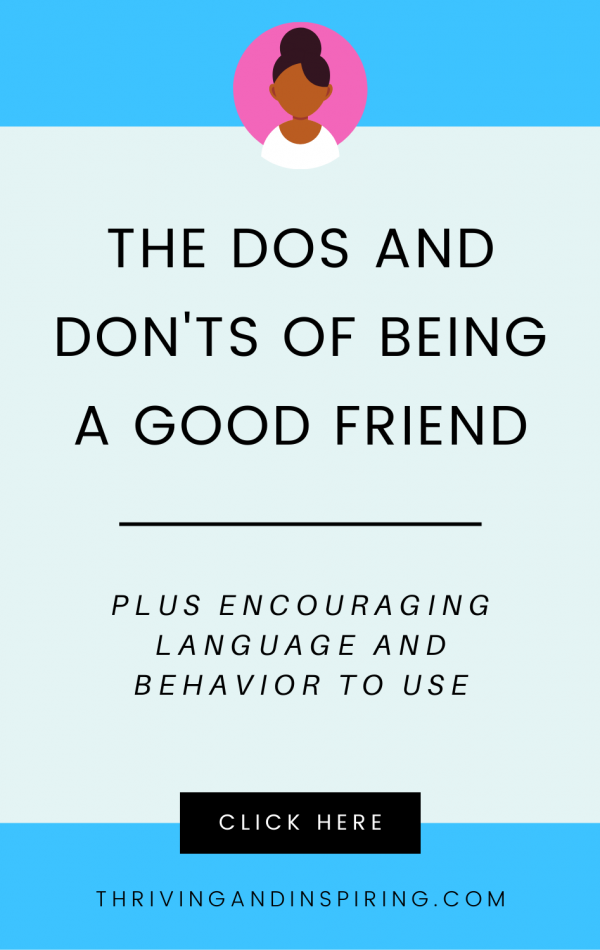
DON’T Problem Solve
Problem-solving is our #1 natural response to the question of how to be a good friend. But we know this isn’t what our loved one needs. They don’t need you to tell them what they should do to get back at the boss that got them fired. They need a safe environment to vent, get it all out there, and begin to process and find clarity.
So don’t swoop in with your cape and try to play hero (even though I know it’s coming from a good place).
Just listen to them.
DON’T Give Advice
Again, just listen. Your friend doesn’t need your input unless they ask.
Unsolicited advice is the worst, am I right?! “You should do this, you should do that…”
Engage in active listening: lean in, tilt your head a little if you’d like, and nod.
Try not to be thinking of what you’ll say next. When they’re talking, fully soak in what they’re saying and be way less worried about what you’ll say in response. Because what they need is someone to listen.
Usually, listening alone is enough. Do your best to mind your own business and not pry for details by asking lots of questions or sharing what you would do in their situation. Just listen.
If they’re really looking for some type of advice, try giving them tips to cultivate inner peace.
DON’T Provide “Toxic Encouragement”
I’m leery of the phrase “toxic encouragement” because I’m a huge fan of encouragement!
But I do believe there can be a toxicity to it if it’s used incorrectly.
When I think of “toxic encouragement”, I think of phrases that invalidate feelings.
Ones like:
“There’s absolutely no need to worry.”
“Just stop stressing about it.”
Instead, try to change those into:
“That does sound worrisome! Anything you can do to alleviate some of that worry?”
“Is there something that can minimize some of your stress?”
Tip: Think about what you need when you’re hurting as a jumping-off point. Absolutely, everyone is different. But if you’re totally clueless on where to start, remember what makes you feel comforted and simply ask if that would help them too.
Tip: Know their love language (there’s a simple quiz here to find out what your love language is) and support them in a way that’s in sync with their love language.
If theirs is words of affirmation, make sure that you’re adequately using your words to show your support.
If it’s quality time, then make an extra effort to spend time with them while they’re hurting. It’s quite logical really!
If it’s giving gifts, send them a thoughtful gift like this!
Tip: When in doubt, simply ask how they want to be supported! It’s straightforward and they’ll be receiving exactly what they need.
Tip: Understand your relationship may change during this time when they’re going through things. That’s normal and okay. Try your best not to get offended.
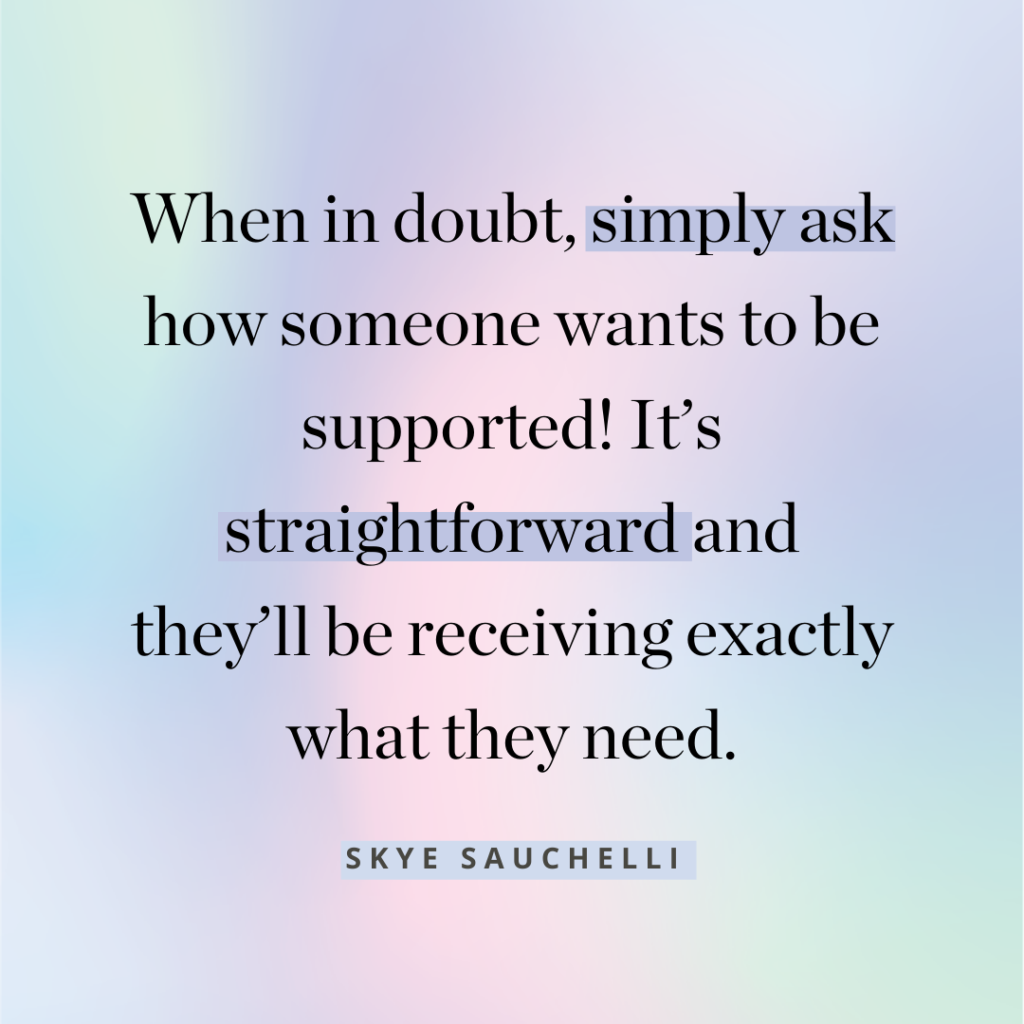
Being a Good Friend- What to Say to a Friend that’s Hurting
Let Them Know There’s No Pressure or Expectations
As I mentioned before, it’s always a good idea to let your loved one know that you don’t need a response. Whether it’s a phone call or text, make it clear that you’re just reaching out to be supportive and that they don’t need to reach back out if they can’t, aren’t ready, or aren’t in the mood to at that moment.
You can try sending a message or leaving a voicemail (Who does that anymore…? Actually I do. It’s so personal and sweet in my opinion.) that says something like this:
“Hey, just wanted to let you know I’m thinking about you/praying for you. I can’t imagine what you’re going through right now but I’m here when you need me. No need to even respond to this.”
“Hope you’re holding up okay. I’m sending love your way. Please let me know how I can support you or if you need anything at all. No need to respond now, but reach out if or when you need!”
“Here if you need me!”
What’s important is that what you say to your hurting friend lets them know:
- There’s no need for them to answer back
- You are available if/when they’re ready
- There’s no pressure or expectation attached
Sometimes Saying Nothing is Best
Keep in mind that sometimes, saying nothing is the way to go. Sure thing, reach out and follow up if you’d like. But if you’re chatting with them, let them talk as much as they want. You don’t need to jump in and interject with your opinions and thoughts. Saying nothing is better sometimes because you’re providing a safe space for them to work through things.
Validate Them
When you’re chatting with your friend or loved one, validating their feelings will feel really good for them.
Make them feel heard and understood, but not by trying to relate to them. You don’t have to be able to relate to feel empathy and compassion for them. Validating them emotionally is about accepting and recognizing their emotions. Keep that at the forefront of your mind as you spend time with a hurting friend.
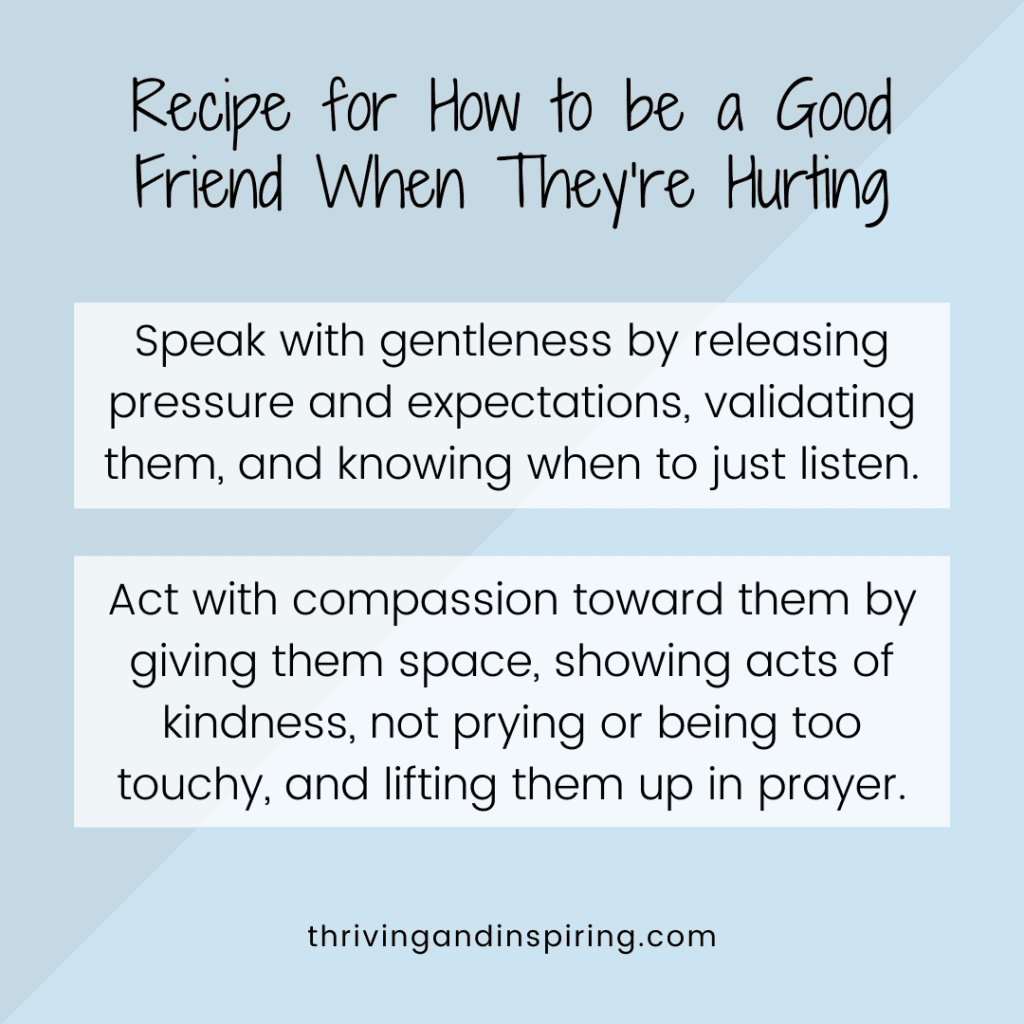
Being a Good Friend- How to Act When a Friend is Hurting
Give Space
Don’t bombard your hurting friend right away after something happens. I know you want to be supportive, but let them take a breather first and collect themselves. You can send one encouraging text that doesn’t require an answer, but after that, give them space and let them contact you.
They will need time to process heavy feelings and may not want to relive what happened over and over by telling the story to friends that are reaching out.
Think about them and what they need. Not what you need.
Don’t Pry
Be accepting of how much they share if and when they do. If they aren’t going deep into something and they’re keeping details to themselves, accept that. They are sharing what they’re able to share and what feels good and natural and right to share at that time.
Don’t Get Too Touchy
I totally understand the desire to bring someone in real close for a big hug when they’re hurting. But not everyone responds well to that. So just ask first if you really feel the need!
Personally, when I’m upset, I don’t like when others try to hug me to give me comfort. It makes me more upset and next thing you know I’m breaking down in the corner of the cafe for all the world to see.
On the other hand, I felt so supported when a friend asked me, “Can I give you a hug?” when I was upset. I was able to let her know how I wanted to receive support by saying, “No, because then I’ll get more upset. Let’s just talk instead.”
Acts of Kindness
I’m such a proponent of little acts of kindness! They go such a long way! You can absolutely do small acts of kindness for a friend or family member that’s going through a tough time.
Send them a little note in the mail (I know it’s old-fashioned but it’s such a sweet sentiment). Bake a batch of cookies and leave them on their porch. Send them a Brightbox (I absolutely loooove this website as a way to spread love).
Lift Them Up in Prayer
If you’re a believer, this is an obvious way to support someone who’s struggling in some way. What better way to love on them than to pray for them?!
Related reading: 3 Misconceptions about Prayer SHATTERED + 3 Tips for More Meaningful Prayer
God is the one who can work in their difficult situation. He is the one who can change or fix things. So why not lift it all up to Him?!
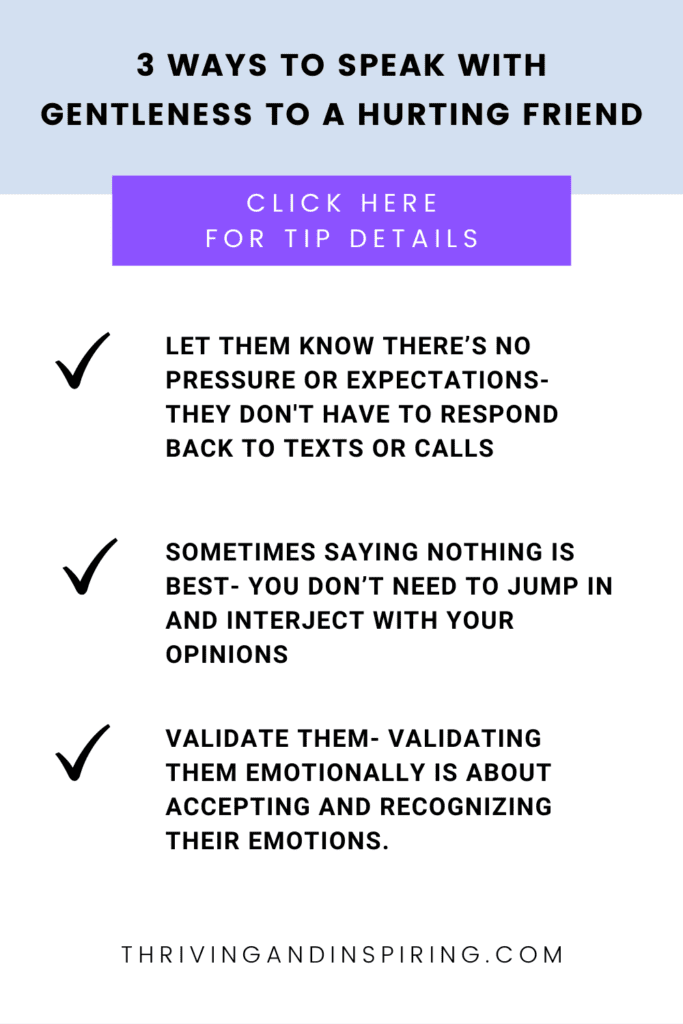
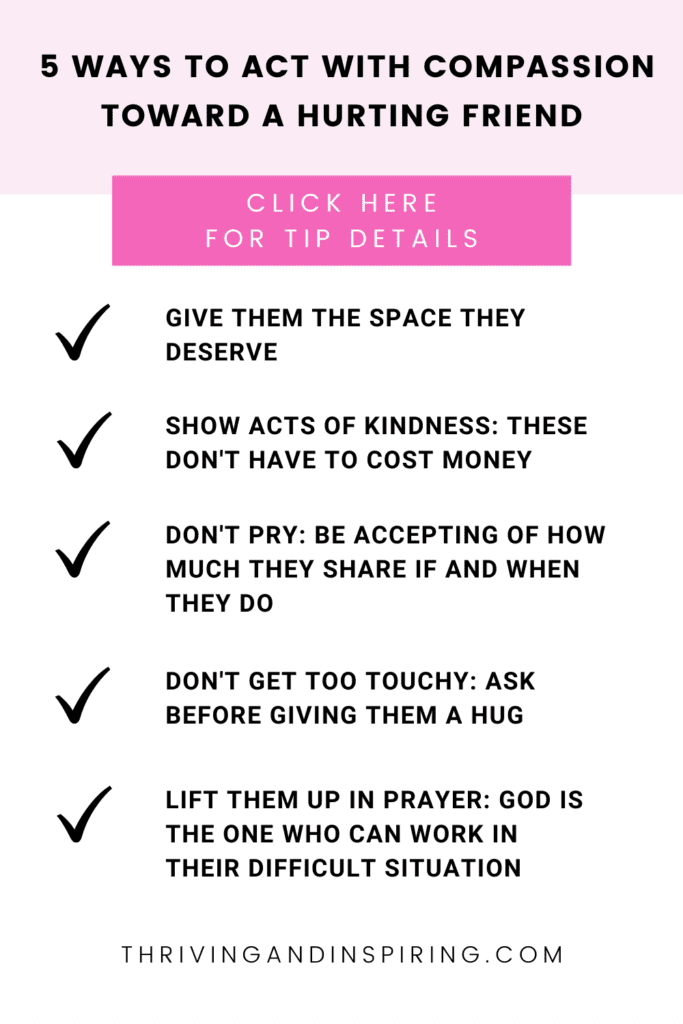
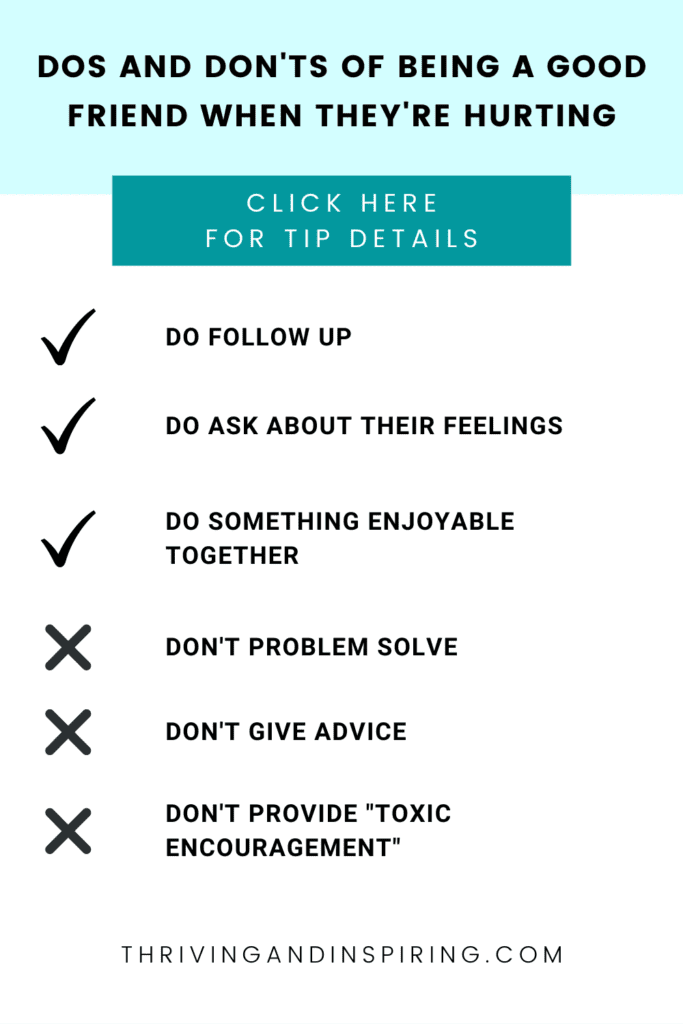
Let’s Bring it Home
Recipe for how to be a good friend when they’re hurting:
Do follow up with them, do something enjoyable together, do ask about their feelings!
Don’t problem solve or give advice, and don’t provide toxic encouragement.
Speak with gentleness by releasing pressure and expectations, validating them, and knowing when to just listen.
Act with compassion toward them by giving them space, showing acts of kindness, not prying or being too touchy, and lifting them up in prayer.
If you were feeling unsure of what to say to support a hurting friend or unsure of how to act, I hope you feel confident now that you know how to support a hurting friend with gentleness using encouraging language and behavior.
| Related Reading:
You Are Who You Surround Yourself With: Who the Right People Are and How to Find Them
Share this post with someone who could benefit from it!
And follow me on Pinterest for encouraging graphics!

I love how detailed your posts are! This was a great rod and will be taking tips from it. I have also used those feel good phrases and had them used on me and you’re right, no one wants to hear that.
Thanks so much for that! I’m so glad you got something out of the post! 🙂